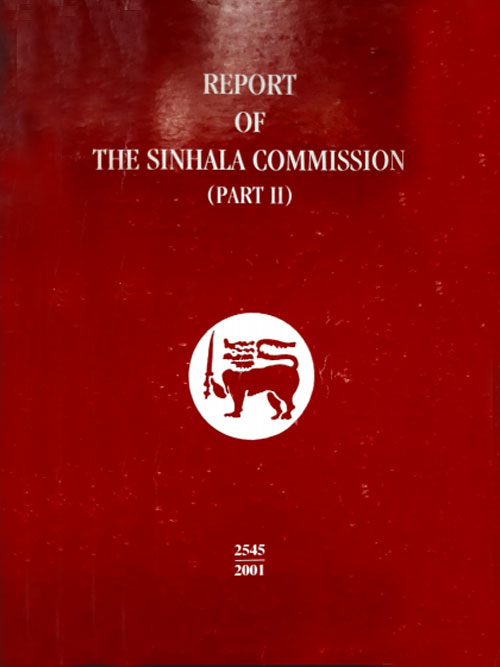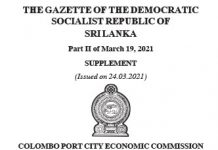SINHALA COMMISSION INTERIM REPORT
on
The Government’s Proposals for Constitutional Reform
Preamble
The National Joint Committee, consisting of a large number of Sinhala
organisations from all parts of the country, appointed this Commission in
- to inquire into and and report on the injustices caused to the Sinhala and to make recommendatioos with a view to rectifying such injustices. In accordance with the terms of reference. this Commission invited by public notice written representations and recommendations from individuals and organisations on matters pertaining to the terms Of reference.
A large number of representations were received and fullher action was taken to hold sessions in various parts Of the country to hear oml evidence.
During the course of these proceedings many important members of the Maha Sangha and of the public pressed on us the urgent need to examine and issue a Report early on the Government’s Draft Proposals for Constitutional Reform with special reference to the possible consequences to the vast majority of the people of this country. if these pmposals were adopted in their present form. We have carefully considered this request and as the Government seems intent on presenting their proposals soon to Parlianrnt, and to the people thereafter, for their approval at a Referendum, we have thought it opportune to issue this Interim Report for appropriate action by the National Joint Committee.
The possible implementation Of these proposals, hereinafter called the “Devolution Package”, in its present form, will to be the biggest threat faced by Sri Lanka in its entire history Of more than 2500 years. This was the consensus of views expressed by many witnesses who gave evidence before (Air Commission. They comprised, among others, Heads of tir three Nikzyas of the Maha Sangha, Representatives of Muslim, Catholic, and Christian Religions, and of the Media, former Governors of the Central Bank, a Parliamentarian, Vice Chancellors and Professors of our Universities, Public Servants, Professionals, School Heads, and business leaders.
The essence Of their submissions was that the implementation of the Devolution Package in its present form will not Only destroy the unitary character of Sri Lanka, which has been preserved for over- 2500 years, but will also spell disaster for the country as a whole. It will further impoverish the Sri Lankan people, in particular the Sinhala people. who are already a disadvantaged section of the population despite their comprising three fourths Of it.
We will now consider the Government’s Draft. This is done under three heads (l) whether the present Parliament has the legislative power to pass suchaConstitution intoLaw (2) the political implications of the Devolution Package and (3) how such a Constitution will affect the economy Of the Country in the future. - Whether the present Parliament has the legislative power to pass such
a Constitution into Law.
1.1 We say, at the very outset, that the Parliament has no legal power to pass into law the Draft Constitution, in its present form, and have it
enacted and adopted as the Supreme Law Of the State. The reasons we give are the following.
1.2 The People’s Alliance forms the Government today, having elected
by the People in the General Elections of 1994. In its Manifesto presented to the People before the Election, with reference to Constitutional Reform, it said as follows: “The People’s Alliance seeks a Mandate from the People of Sri Lanka to abolish the Executi ve Presidency and promulgate and operate a new Constitution designed to restore fully to the people their sovereignty,
which will be exercised through their representatives in Parliament. The People’s Alliance upon forming a government, will convene a Constituent Assembly, consisting of the Members of the Parliament, to formulate and adopt the new Constitution which will derive its force and validity from the expression of the political will Of the People.”
1.3. Up to date no Constituent Assembly has been convened, even though, three years have lapsed after the last General Election. But the Government hopes to use the powers given to Parliament under the present Constitution to repeal it and then promulgate a new Constitution on the lines of the Devolution Package. It will be necessary therefore to consider now what legislative powers the Parliament has under the Constitution to repeal it and enact a new Constitution. Before we do so we Shall look into the genesis
of the present Constitution.
Under the Ceylon Independence Act of 1947, the Ceylon Independence
order in Council of 1948, and the Ceylon (Constitution) Order in council of 1947, here after referred to as the Soulbury Constitution our country achieved its independence, and it became the Supreme Law of the Land.
The power of the Parliament to make laws was given by Section 29 Of the Order in Council, which reads as follows;
(l)Subject to the provisions of this Order, Parliament shall have power to make laws for the peace, order and good government of the Island.
(2) NO such law shall (a) prohibit or restrict the flee exercise of any religion;
or (b) make persons Of any community Or religion liable to disabilities or restrictions to which persons Of other communities or religions are not made liable or
(c) confer on persons Of any community or religion
any privilege Or advantage which is not conferred on persons of other communities or religions (d) alter the constitution
(3) Any law made in contravention of subsection (2) of this section shall, to the extent of such contravention, be void.
(4) In the exercise Of its powers under this section, Parliament may amend or repeal any of the provisions Of this Order, Or of any Other Order of Her Majesty in Council in its application to the Island.
Provided that no Bill for the amendment or repeal of any Of the provisions of this Order shall be presented for the Royal Assent unless it has endorsed on it a certificate under the hand of the Speaker that the number of votes cast in favour thereof in the House of Representatives amounted to not less than two thirds Of the whole number Of Members of the House
(including those not present).
Every certificate of the Speakerunder this subsection shall be conclusive
for all purposes and shall not be questioned in any court of law.
1.5 This Constitution could be amended but it would still be subject to the
restriction imposed On it by the proviso in Section 29 (2). In Bribery
Commissioner V Ranasinghe 1965 AC 172 in an appeal from Sri Lanka
the Privy Council said: “a legislature has no power to ignole the conditions
of law making that are imposed by the instrument which itself regulates the
power to make law. This restriction exists independently of the question
whether a legislature is sovereign .
I .6 “Commonwealth countries, a little time after achieving independence, often
wish to base a revised constitution on a local grundnorm,: they assert the
principal of constitutional “autochthony”, that is their constitution is sprung
from their native soil and not derived from a United Kingdom Statute.
Strictly, autochthony requires a breach in legal continuity, an actual or
technical revolution.” Constitutional and Administrative Law by Hood
Phillips and Jackson, p.759.








